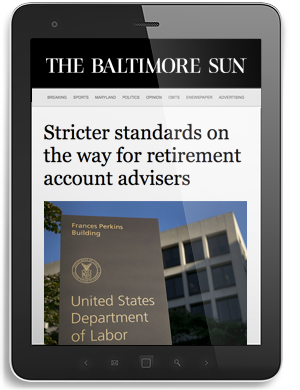U.S. Department of Labor Public Hearings on Making Retirement Investing Safer
New Guard vs. Old Guard! Scott Puritz debates Ron Kruszekski, the CEO of Stifel Financial, a large stock brokerage house, on the merits of the new US Department of Labor rules designed to make retirement investing safer.
To see Rebalance’s Managing Director, Scott Puritz testify, go to 08:37.
Speaker: … and you tell me if you think they’re workable and if you think they are not workable, tell me why they’re not workable.
Speaker 2: Recently, the U.S. Department of Labor held hearings on new rules that require financial advisors to act in the best interest of their clients and to disclose the real cost of the investments they recommend.
Speaker: You know, a commitment that when your reps are giving advice to people that that advice isn’t going to be affected by their financial incentives but just going to be what’s in the interest of the customer.
Speaker 2: Managing Director of Rebalance, Scott Puritz, is a nationally recognized authority on retirement investing and was invited to provide expert testimony.
Mr. Puritz: The marketplace is not working. It just categorically is not working. There is not true awareness of the multi-layer of fees. We surveyed our clients who had come over from brokerage relationships, and 83% of them had no idea of the second level of fees.
Speaker: Also invited was Ron Kruszewski, CEO of Stifel Financial, a 125-year-old brokerage house that opposes the new rule. Puritz and Kruszewski squared off.
Mr. Kruszewski: And to the extent that the market supports a business model like yours, I’m all for you.
Mr. Puritz: How about a regulatory level playing field, what’s wrong with that?
Mr. Kruszewski: We have one.
Mr. Puritz: No we don’t. That’s just absurd.
Speaker 3: Can you elaborate? What’s not level about the playing field?
Mr. Puritz: A completely different set of standards. “Best interest” is not a fiduciary standard.
Speaker: Under current rules, brokers are not required to disclose the fees they charge. Even small fees add up and compound over time, and may compromise an investor’s ability to retire with a comfortable nest egg.
Mr. Puritz: Albert Einstein is to said to have described compound interest as the most powerful force in the universe, but long-term compounding is a double-edged sword. Fees also compound and unnecessarily eat away of retirement savings. In the case of our client Moira, by the time she retires this extra $5,000 in annual fees would have compounded potentially to over $500,000 of extra fees. For many Americans, this extra retirement investment fee burden is the difference between retirement investment security and having to take on a part-time job late in life.
Speaker: The Department of Labor’s new rule is designed to save investors billions of dollars they lose each year due to conflicted investment advice and hidden fees.
Mr. Puritz: Well, there’s one level of fees that are disclosed, if you will, or the consumer seems to be aware of, the classic 1%, 1.5% or some different configuration, but where there is almost always a lack of awareness is at the fund level, where there are actively managed mutual funds that are frequently recommended, and that’s the missing piece in the marketplace.
Speaker: One way to avoid that risk right now is to make sure that your advisor is a registered fiduciary. To find out more, go www.rebalance-ira.com.




